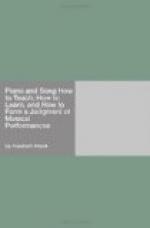* * * * *
I ought to express myself more fully with regard to expression in piano-playing. It is difficult to perform this task, at least in writing; for it can more easily be practically explained to individual learners. Intelligent teachers, who are inclined to understand my meaning, will find abundant material, as well as all necessary explanations, in the preceding chapters; and I will merely say that a teacher who is endowed with the qualities which I have designated as “the three trifles” will seek to excite the same in his pupils; will refine and cultivate them, according to his ability, with disinterestedness, with energy, and with perseverance; and truth and beauty will everywhere be the result. Thus he will remain in the present, where there is so much remaining to be accomplished. These three trifles certainly do not have their root in folly, want of talent, and hare-brained madness; therefore the possessors of the latter must look to the “future,” and proclaim a “higher,” that is, an “inverted beauty.”
Rules for Piano Pupils.
You must never begin to learn a second piece until you have entirely conquered the first.
You ought to fix your eyes very carefully on the notes, and not to trust to memory; otherwise, you will never learn to play at sight.
In order to avoid the habit of false fingering, you should not play any piece which is not marked for the proper fingers.
You should learn to play chords and skipping notes, without looking at the keys, as this interferes with a prompt reading of the notes.
You must learn to count nicely in playing, in order always to keep strict time.
To use for once the language of the times, which boldly proclaims, “Such things as these belong to a stand-point which we have already reached,” I wish that the musicians of “the future” may as happily reach their “stand-point,” not by hollow phrases and flourishes, and the threshing of empty straws, but by practical, successful efforts, and striving for that which is better.




